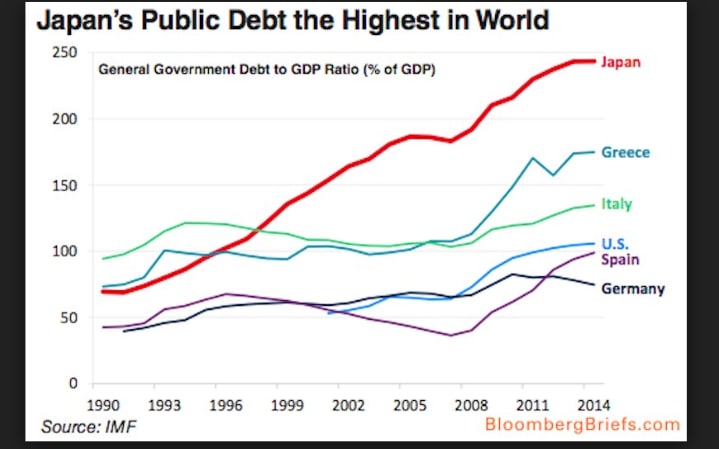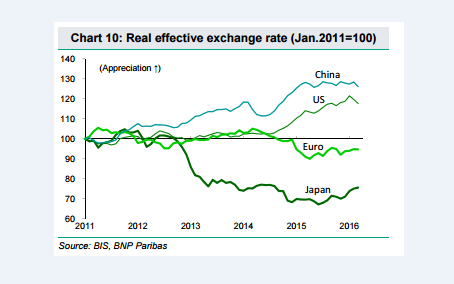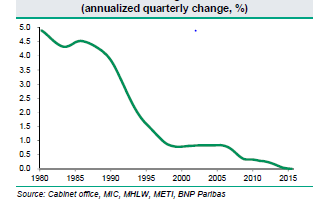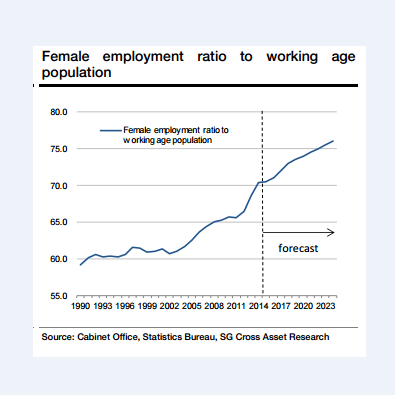AEP: Japan's Abenomics 'dead in the water' after US currency warnings
(米国の為替ワーニングでアベノミクスが「暗礁」に)
Ambrose Evans-Pritchard
Telegraph: 28 APRIL 2016 • 8:01PM


(米国の為替ワーニングでアベノミクスが「暗礁」に)
Ambrose Evans-Pritchard
Telegraph: 28 APRIL 2016 • 8:01PM
The Bank of Japan has been forced to retreat from further emergency stimulus after a blizzard of criticism at home and abroad, and warnings that extreme measures may now be doing more harm than good.
国内外で非難の嵐が巻き起こり、そのような極端な対策はもはや薬よりも毒だというワーニングを受けて、日銀は緊急刺激策の中止を余儀なくされました。
The climb-down by the world's most radical central bank is the latest sign that the monetary experiments since Lehman crisis may have run their course. The authorities have not exhausted their ammunition but are hitting political and legal constraints.
世界で最もラジカルな中銀の撤収は、リーマン危機以降の金融実験が終わった可能性を示す最新のサインです。
日銀は弾が尽きたわけではありませんが、政治的、法的な壁に突き当たりました。
The yen surged 3pc against the US dollar in the biggest one-day move in eight months and equities skidded across Asia after the Bank of Japan (BoJ) failed to take fresh action to stave off deepening deflation, catching markets badly off guard.
日銀が悪化するデフレを食い止めるための新たな対策を出せなかった後、日本円は米ドルに対して一日の上昇幅としては8ヶ月ぶり最大の3%も上昇し、アジア全域で株が暴落して、市場は酷い不意討ちを食らいました。
Governor Haruhiko Kuroda dashed hopes for 'helicopter money', warning that direct monetary financing of spending would be "illegal".
黒田東彦日銀総裁は日銀が国債を直接引き受けることは「違法」だとワーニングして、「ヘリコプター・マネー」への期待を潰しました。
Mr Kuroda insisted that the BoJ still has plenty of firepower and can at any time push interest rates even deeper into negative territory or boost bond purchases beyond the current $74bn a month. "If additional easing is needed, we will do so promptly," he said.
また、日銀には未だ十分余力があり、いつでもマイナス金利を更に引き下げたり、現在は月740億ドルの国債買付を強化することが出来ると強く主張しました。
「追加緩和が必要であれば即座に実行する」とのこと。
The reality is that negative rates (NIRP) have backfired badly on every front. They have prompted bitter protests from banks and money market funds caught in a squeeze.
現実には、マイナス金利はあらゆる側面で酷いブーメランになっています。
苦しい立場に追い込まれた銀行やMMFからも、猛烈な抗議が起こっています。
The yen has appreciated by 10pc since the BoJ first embarked on the policy in January, the exact opposite of what was intended. The rising yen - 'endaka' – is pushing Japan deeper into a deflation trap and undercutting the whole purpose of 'Abenomics'.
日銀が1月にマイナス金利に乗り出してから、日本円は10%上昇しましたが、これは意図したことの真逆です。
上昇する円(「円高」)で日本は債務デフレ・トラップの更に深みへと追い込まれ、「アベノミクス」の目的の全てを損なっています。
Core inflation has fallen to minus 0.3pc. The Nikkei index of equities in Tokyo has dropped 13pc this year, with contractionary wealth effects that make the BoJ's task even harder. "Negative rates have completely failed," said David Bloom from HSBC.
コア・インフレ率は-0.3%まで下落しました。
日経平均は今年に入って13%下落しており、この資産縮小の影響で日銀の任務は一層困難になっています。
「マイナス金利は完全に失敗」とHSBCのデイヴィッド・ブルーム氏は言います。
Washington will not tolerate the use of NIRP in any case, deeming it a disguised attempt to drive down exchange rates and export problems to the rest of the world.
いずれにせよ、米政府はこれを円安誘導と世界への問題輸出の隠れ蓑とみなして、マイナス金利の実施を看過しないでしょう。
Jacob Lew, the US Treasury Secretary, warned Japan and the eurozone at the G20 in Shanghai in February that the Obama administration is losing patience with use of beggar-thy-neighbour tactics by countries already running a current account surplus. They are in effect shifting their excess capacity abroad. Germany in particular is coming into the US cross-hairs.
ジェイコブ・ルー米財務長官は2月に上海で開かれたG20で、オバマ政権は経常収支が黒字の国による近隣窮乏戦術にしびれを切らしつつある、と日本とユーロ圏にワーニングしました。
ドイツは特に米国にロックオンされています。
Richard Koo from Nomura said the US is now on the warpath against currency manipulators. Mr Lew's threat effectively renders Abenomics "dead in the water".
野村證券のリチャード・クー氏は、米国は今や為替操作国と闘うつもりだと言います。
長官の脅しでアベノミクスは事実上「暗礁に乗り上げる」こととなりました。
The Japanese economy is contracting again, caught in a debt-deflation vice. Growth has been negative for four of the last eight quarters. What was once a 'Lost Decade' is turning into a "Lost Quarter Century" with no remedy in sight.
日本経済は債務デフレに締め上げられて再び縮小中です。
成長率は過去8期中、4期でマイナスとなりました。
かつての「失われた十年」が、当面何の解決法も見えないまま、「失われた四半世紀」になりつつあります。
"Their options are diminishing. I can't see any way out of the debt-trap, and it is an acid test for the western world," said Neil Mellor from BNY Mellon.
「彼らのオプションもなくなりつつあるからね。この債務トラップを抜ける術は全くわからん。西側世界にとってのリトマス試験だ」とバンク・オブ・ニューヨーク・メロンのニール・メラー氏は言います。
Public debt is rising fast on a shrinking economic base, pushing the public debt ratio to an estimated 250pc of GDP this year. "The debt will never be 'repaid' in the normal sense of the word," said Lord (Adair) Turner from the Institute for New Economic Thinking.
政府債務は縮小する経済基盤の上で急増中で、今年は債務比率がGDPの250%になると試算されています。
「この借金が、通常の言葉の意味において『返済される』ことは永遠にないだろうね」と新経済理論研究所のロード・ターナーは言いました。
Olivier Blanchard, the former chief economist for the International Monetary Fund, warned recently that country is nearing the end-game as the pool of domestic funding for the bond market starts to dry up and the Japanese treasury is forced to rely on much more costly capital from global investors.
IMFの元チーフ・エコノミスト、オリヴィエ・ブランチャード教授は先日、債券市場向けの国内資金が枯渇しているので日本のエンドゲームは近い、財務省は遥かに金利の高い海外投資家の資金に頼らざるを得なくなるだろうと警告しました。
Mr Blanchard said the funding crisis risks coming to a head rapidly, forcing the Bank of Japan to plug the gap by printing money in a "life or death" gamble. This will ultimately lead to an inflationary spiral, a form of debt default.
教授曰く、財政危機は急に表面化する恐れがあり、日銀は「生きるか死ぬか」のギャンブルで貨幣増刷で穴埋めをせざるを得なくなるとのこと。
これは最終的に債務デフォルトの一種であるインフレ・スパイラルを引き起こすでしょう。
Ryutaro Kono from BNP Paribas said the BoJ's bond purchases are already soaking up the entire budget deficit, with as much to spare. "All the government has to do is to decide on more fiscal spending, and Japan will have begun a de facto helicopter drop," he said.
BNPパリバのリュウタロウ・コウノ氏は、日銀の国債買付は既に全ての財政赤字を吸い上げている、まだまだ余力もあると言います。
「財政支出の追加については、どの政府も決断しなければいけないし、日本は事実上のヘリコプターマネーを開始するだろう」
Premier Shinzo Abe is already drawing up plans for a $100bn blitz of extra spending this year, and is hoping to cajole the rest of the G7 to support a joint fiscal expansion to pull the global economy out of the doldrums at a summit in May.
安倍晋三総理大臣は1,000億ドル規模の財政出動を今年中に行う既に計画中です。
また、5月のサミットで国際経済の膠着状態を打開させるために、他のG7諸国から合同財政拡張への支持を取り付けたいとしています。
Mr Kono said the underlying problem is that Japan's trend growth rate has fallen below zero as baby boomers retire and demographic crunch worsens. The slightest shock tips the economy back into recession. "This is something neither monetary easing or fiscal stimulus can rectify," he said.
コウノ氏曰く、根本的な問題は、団塊世代が退職して人口減少が悪化する中で、日本の成長率のトレンドがゼロを切ってしまったことだそうです。
ちょっとしたショックでも日本経済は不況に逆戻りでしょう。
「これは金融緩和でも財政刺激でも是正出来ない」
A shrinking workforce means that Japan can have a tight labour market – with unemployment falling to 3.2pc in March, and the job-to-applicant ratio rising to 1.3 – even though growth is negative. Nothing like this has been seen before in the modern world.
労働人口が減少しているということは、マイナス成長中にも拘らず、日本の労働市場が厳しくなり得るということです(3月は失業率が3.2%まで減少して、求人倍率は1.3まで上昇しました)。
このようなことは近代史上前代未聞です。
The only way out of impasse is a blast of deep reform to raise productivity and mobilize women. This means firing the 'third arrow' of Abenomics. There have been successes but it has been patchy.
膠着状態を脱出する唯一の方法は、生産性と女性の就労を強化するために徹底的な改革を大々的に実施することです。
これがアベノミクス「第三の矢」を放つということです。
成功例も出ていますが、良かれ悪しかれと言った状況です。
'Womanomics' has raised female participation rate from 68pc to 71pc, chiefly by building crèches for children and better nursing care for the elderly so that women can work. The electricity monopolies have been broken up. The Trans-Pacific Partnership (TTP) was agreed in October and will be a wake-up shock for the backwaters of the Japanese economy.
「ウーマノミクス」は女性の就労率を68%から71%に改善しましたが、主に女性が働けるように託児所を作ったり老人介護を改善したりしたことが要因です。
電力も自由化されました。
TPPも10月に合意され、日本経済の僻地に衝撃を走らせるでしょう。
Mr Kono said it may be a good thing if the BoJ fails to debauch the yen. Japanese companies pocketed the windfall gains from higher margins rather than investing when the exchange rate was weak, but on the other side of the ledger households suffered a serious hit to their living standards from higher import prices. The effect was asymmetric.
コウノ氏は、日銀が日本円を下落させ損ねるのは良いことかもしれない、と言います。
日本企業は円安の時も為替差益の棚ボタ利益を抱え込んで投資しませんでしたが、その裏側では家計が輸入価格の高騰でやりくりに困っていました。
非対称的な効果があったと言うわけです。
"Currency depreciation in the end only transferred income from working-age families to exporters, who are less inclined to spend. You cannot get results by doing this," he said.
「通貨安は最終的には労く世代の所得から輸出業者に転移されるだけで、後者は余り金を使わない。こんなことをしたって結果は出せない」とのことです。

























